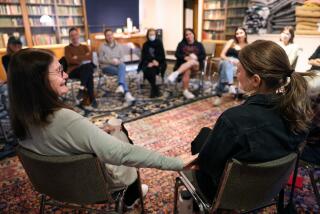Giving Life to Tales of Death, but Sticking to Nonfiction
- Share via
LAS VEGAS, N.M. — They gathered this weekend at a historic hotel said to be graced by a ghost or three, to discuss the public’s fascination with real-life stories that begin with death and work backward.
Talking among themselves at this unusual workshop, they realized that they are among the nation’s most popular writers, although their names are not well known.
They write obituaries, not so much of celebrities and other newsmakers, but of ordinary people who, in death, may help illuminate life.
The stories trigger laughs and tears and outbursts of anger, and can end up in scrapbooks or placed inside coffins, like identification papers for a journey.
The obituaries are treasured too by a public that is titillated by the life stories of total strangers, enriched by learning how the deceased touched a town or affected history.
Because of the response they receive from grieving families and anonymous readers, these obituary writers say they relish a task that, years ago, was considered entry-level work for journalists having to pay their dues.
“I’ve interviewed an awful lot of famous people, including the Dalai Lama, but I’d rather interview people like the old widower who told me, ‘You never realize how much noise an old woman can make until she’s gone,’” said Jim Sheeler, who scours Colorado’s death announcements weekly and selects one person to highlight in a 1,200-word obituary in the Denver Post.
“It’s cathartic for the family to share the person’s life with me,” he said. “I feel like a hospice worker, and to be allowed that intimacy into a life is a privilege.”
Sheeler was one of about two dozen writers, funeral directors, academics and obituary Web site operators who attended the 4th Great Obituary Writers’ National Conference in this high-country town in northern New Mexico.
The workshop was founded by Carolyn Gilbert, a government consultant from Dallas who is fascinated by obituaries.
She organized the group so that writers could meet one another, share experiences and elevate the craft.
“I’m the person who kept my subscription to the hometown newspaper every time I moved so I could keep track of everyone. The obituaries become snapshots of the people I’ve known.”
Newspapers regularly charge a fee to publish obituaries written by family members, and some print free, curt announcements of every death in their circulation areas.
But a growing number of editors have recognized the popularity of obituaries and are assigning accomplished feature writers to prepare them. Some writers tackle the job with flair and style, viewing today’s obituary as “creative nonfiction.”
“Richly written obituaries are a journalism art from the 1880s that have again blossomed,” said Nigel Starck, a journalism professor from the University of South Australia who has researched the history of obituaries and was the keynote speaker.
“The obituary is the finest form of journalism--it’s investigative, requires accuracy and is written by an absolutely inquisitive person with a mix of candor and elegance so that it is rewarding to both the writer and the reader.”
The popularity of such stories was proved again by the New York Times, which was widely lauded for publishing more than 1,800 capsule profiles of the victims of the Sept. 11 terrorist attacks. The effort contributed to the Pulitzer Prize awarded to the newspaper this spring.
New York obituary writer Steve Miller, who escaped from one of the World Trade Center towers moments before it collapsed, read several of the profiles Saturday, holding back tears. The stories, he said, “raised my consciousness that everyone is precious.”
Claire Martin said her own experiences with family deaths have made her an empathetic obituary writer for the Denver Post. “I know what it’s like to be on the other side of an obit.
“And kids are the hardest to write about. I try to include little details in their stories. Their favorite songs. Their favorite toys. I’m writing for the family, and I’m writing for all the people who have experienced a death, because it’s a universal experience.”
But for all their somber reflections and insightful anecdotes, families may not always tell the complete story, writers have learned.
Alana Baranick, of the Plain Dealer in Cleveland, recalled how a family had pressed for an obituary of a man who appeared to have done nothing for several years of his life. She investigated and found that the man had served prison time for murdering his mother. “I told the family, if we’re going to do his obituary, we need to mention that fact. The family had second thoughts.”
Kay Powell, for six years the obituary editor for the Atlanta Journal-Constitution, recalled writing about a man who, according to the family, died after a fall. She learned weeks later that the man had fallen because he had been shot by his daughter.
While even the simplest lives can offer important stories, the challenge to the obituary writer is choosing which ones to tell.
“You just can’t say to someone, ‘Your daddy’s not important enough,’ but that’s what you have to say in so many words,” Powell said. “We have 50 deaths a day [in Atlanta], and 48 of them will go unwritten.
“It’s a hard and painful decision on which ones to write. But my obligation is to give my readers a good read.”
More to Read
Sign up for our Book Club newsletter
Get the latest news, events and more from the Los Angeles Times Book Club, and help us get L.A. reading and talking.
You may occasionally receive promotional content from the Los Angeles Times.










